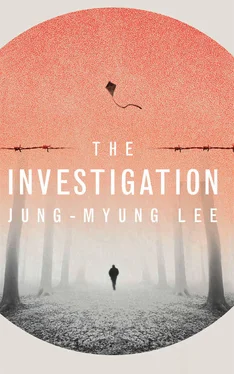Dong-ju dipped a finger in a can of dark-navy paint under the dye-bath. He scrawled something on the dirty wall, before wiping his finger on his uniform. He looked at me with relief. He stood awkwardly in front of the wall, hiding the words. A guard was watching suspiciously from the other side of the room. I took out my club, approached Dong-ju and whacked him on the thigh. He winced and lost his balance. The guard turned around and started talking with the others again. Dong-ju whispered to me what he’d written for my benefit. ‘Sky, Wind, Stars, Poetry.’ I nodded in unspoken promise. If he lost all his memories,
I would bring him here to these words. Even if he couldn’t remember, I would tell him that he was a poet, and would always be one. That I remembered his poems, that I was safekeeping that part of his soul. A smile bloomed on his face, unsullied and strong. I stood in front of him, facing out, so that the guards wouldn’t see his face. That was the only kindness I could offer.
Dong-ju’s health deteriorated rapidly. During our time in the interrogation room he spoke less and less, uttering only half-formed sentences and tangled thoughts. Our conversation was like Morse code: a long silence interrupted by a short dialogue, leading to an even longer silence and an even shorter exchange. His spark was vanishing, like the last breath of a dying man. Eventually our conversation ceased entirely — silence, longer silence and, finally, endless silence. I wasn’t sure if he was choosing not to talk or if he couldn’t. His memories had scattered like fallen leaves; thin winter branches were all that were left, leaving behind a barren tree yearning for a bygone summer. Dong-ju no longer recalled his brilliant past; he merely suffered through empty time.
On what would end up being our last day in the interrogation room, we shared a silent conversation. I felt his exhaustion and his pain as though they were my own.
Suddenly, his lips opened. ‘“Frightening Times.” Who are you, calling me? / In a shadow of green oak leaves, / I am still breathing. / I who have never raised my hand / I who don’t have the sky to greet with my hand / Why are you calling me / I, who have no sky to put my body under? / On the morning of my death, after my work is done / Oak leaves will fall in peace. / Do not call me.’
I scribbled down his halting words. Was this the last light emitted by his pale soul, lightning tearing through darkness one last time? The words blurred. Why was it this poem that he remembered now?
Suddenly it reminded me of one of his favourite poets, Francis Jammes, and one of his poems that I’d come across in Dong-ju’s box of confiscated documents:
IT WAS TERRIBLE
It was terrible to see that poor struggling little calf being dragged
just now to the slaughterhouse,
and who tried to lick the rainwater
on the grey walls of the sad little town.
O my God! he seemed so gentle
and so good, he who had been the friend of the holly-lined lanes.
O my God! You who are so good,
tell us that there will be a pardon for us all
— and that some day, in golden Heaven, we shall no longer
murder precious little calves,
and, instead, having become kindlier,
we shall wreathe their little horns with flowers.
O my God! Don’t let that little calf
Suffer too much as he feels the knife enter.
I looked away; I didn’t have the courage to look Dong-ju in the eye. We were the ones who started this horrible war, we were the ones who put him behind bars, we were the ones who had destroyed him. Whether we wanted it or not, we had all consented to this terrible war waged in the name of our country. Could we be forgiven for that?
Dong-ju continued performing hard labour, his body frail and doe-like. I didn’t know where he was going; he may not have known, either. The workroom was hot, filled with smoky dust, the dizzying clatter of the sewing machines and the strong smell of dye. The prisoners’ faces glistened, blackened by sweat, dust and dye. We urged them on, swinging our clubs. Dong-ju went between the sewing machines and the dye-bath like a dung beetle, pulling the cart piled with uniforms behind him. He pulled that heavy cart with all his might.
The siren rang out loudly, signalling break time. Men collapsed like blades of cut grass. Dong-ju put the handle of the cart down on the ground and sank to the floor. Sweat glistened on his forehead.
‘You okay?’ I asked, taking care to tamp down the trembling in my voice.
He looked at me blankly. Then he smiled in recognition. ‘Ah!’
That was it. He didn’t know who I was. I could tell he was analysing my features, noting my short hair and brown uniform, considering whether I knew him and, if so, how. He knew he was a prisoner, but he didn’t know why he was there. He knew he was a poet, but he didn’t know what he wrote. He knew he read books, but didn’t know their contents. Did the times we spent together remain in his memory? Our quiet literary conversations in the interrogation room, the secret underground library, the black books that had lived there, the postcards he wrote, the sound of singing that he listened to, as he trembled in the corridor of the infirmary ward? I hoped so, even if they couldn’t be recovered. I wanted to help him — to tell him who he was.
I grabbed his thin wrist. He followed me placidly. We walked through the groups of resting prisoners. I tightened my grip when he lost his balance and let go only when we got to the dye-bath. I turned him towards the wall marked with the words — Sky, Wind, Stars, Poetry. A smile bloomed on his face, the same one I’d seen the first day I met him. But now, everything had been taken away from him. I was the only one who knew the man he used to be. He was a child born into a lost nation; a boy who lived in a house with a plum tree, who ate mulberries and revelled in the blue sky reflected in the well; a child who looked up at the cross on the tip of a high steeple, sad that his country was no longer; a teenager who loved Tolstoy, Goethe, Rilke and Jammes, bringing a precious book he bought at a used book-shop to his boarding house, feeling as though he’d conquered the world; a studious young man who read that book all night; a writer of brilliant poems that nobody ever read; someone who liked to walk along a winding path; a boy who loved a girl without telling her so; a colonized man whose soul had been shattered by the dark era, but still created sparks; a traveller who boarded a boat and left home, studying in a six-mat tatami room in a foreign country; a young man awaiting the dawn of a new era; an offender shackled for writing poems in his native tongue; a son longing for his mother in far-away Manchuria; a prisoner awaiting the bugle signalling dawn in this cold prison, flying kites on windy days; a man who always had a smile on his face.
Dong-ju was staring at his own handwriting; he had missed those words dearly. They remained a promise, telling him who he was, how pure his soul was, how he wrote beautiful poems. He reached out with a trembling hand to touch the words.
In a low voice I recited ‘Night Counting Stars’. ‘The sky of passing seasons / Is filled with autumn. // Without a single worry / I think I can count all the autumn stars. // The reason I can’t count all the stars carved one by one in my heart is / because morning is coming, / because night will fall again tomorrow, / because my youth is not yet gone. // For one star, memory / For one star, love / For one star, loneliness / For one star, longing // For one star, poetry / For one star mother, mother. // Mother, I call out one beautiful word for every star. The names of children I shared a desk with in primary school, the foreign names of girls, Pei, Jing, Yu, other girls who have already become mothers, the names of impoverished neighbours, dove, puppy, rabbit, donkey, deer, the names of poets like Francis Jammes and Rainer Maria Rilke. // They are so far away. / Like stars in the beyond, // And you, Mother — / you are in Manchuria far away. // Longing for something, / On top of the hill under falling starlight / I etched my name, / And covered it with dirt. // The insect that cries all night / Does because of its sorrow about its shameful name. // But after winter passes and spring dawns on my star, / On the hill where my name is buried / Grass will stand thick and proud / Like green grass blooming on a grave.’
Читать дальше












